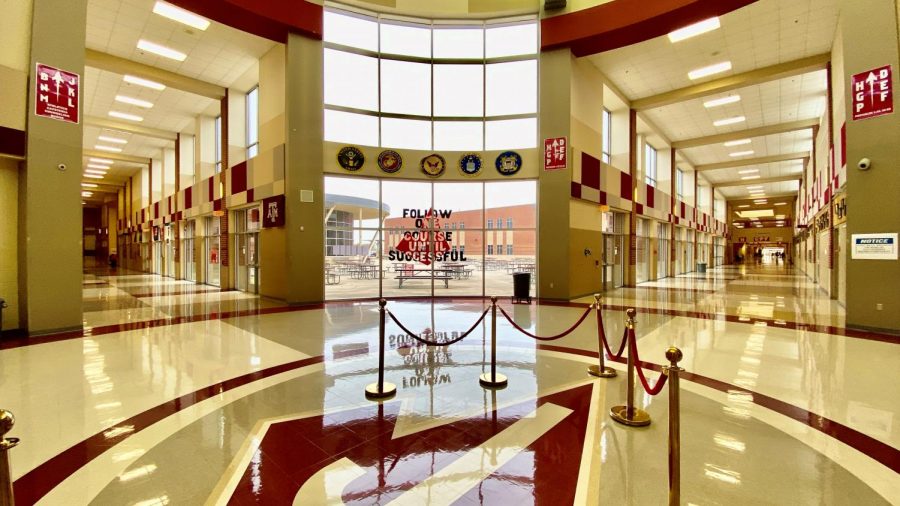Number of students failing dramatically increases
Photo By: Mr. Cabrera
As the pandemic continues to rage in the area, fewer and fewer students are coming to face to face instruction. With close to 2700 students enrolled, a usual busy hallway is now oddly quiet.
Due to COVID-19 changing the way Judson High School is teaching in 2020, moving over to virtual learning with face-to-face being optional, failure rates for students have significantly increased this year than in previous years.
This is being seen not only at Judson but throughout the state, as student’s grades are being impacted by virtual learning.
“It’s drastically higher this year,” AP Government teacher Mr. Aaron King said. “Typically, I teach about 240 students a year (120ish each semester). In most years, I have about three students fail my class (one or two each semester) all year long. So that’s about 3 / 240 who fail, which is only 1.25% of my class. This first 9-weeks, I had 28 out of 121 students fail. That is over 23% of my class. Sadly, it is even worse right now at the beginning of the second 9-weeks, the number of students currently failing is more than the 28 that failed last nine-weeks.”
Although many factors can be the cause for students failing this year, AP US History teacher Mr. Rory Hoxie says self-discipline could be a big factor.
“I really think it is hard for students to maintain a consistent school schedule. I see assignments being turned in at one or two in the morning and some students are working jobs during the day. Having an asynchronous schedule requires a lot of self-discipline,” Hoxie said.
With self-discipline being a factor, senior Aaron Perez also feels as if students aren’t getting the leisure time they had before COVID-19.
“One of the big reasons why so many students are failing right now is because they feel burnt out. I’m no expert, but discouraging students from going out or meeting up with friends (even for extremely good reasons such as this pandemic) takes away a ton of avenues for students to enjoy their lives, relax, and recharge,” Perez said.
On top of the failure rates, mental health has been a concern for many students, especially when they are not on campus.
“I’ve spoken with many students who are dealing with depression, anxiety, and other issues that are seriously impacting their lives. I’m also concerned that many seniors won’t meet the graduation requirements and either have to make up classes in the spring or complete credit recovery,” Hoxie said.
Reinforcing Hoxie’s claim, Perez has found virtual school to have its own fair share of pressure.
“I definitely feel like my mental health has taken a hit this year in trying to stay on the up and up with school and college preparation,” Perez said.
Many obstacles come with teaching virtually, unfortunately, the biggest obstacle is one that teachers simply can’t control.
“The hardest part of the year has been keeping students motivated. When you are face-to-face, there is a stronger connection and relationship. However, I have been giving students far more extended time to complete assignments and not deducting for late work,” Hoxie said
Even with the adjustment of workload and altering the grading policy, it doesn’t seem a change is happening with students.
“There is very little I’ve done differently in terms of our workload, calendar, pace, etc. For regular Government, however, the workload is significantly down. They are having to do far less than in previous years, have shorter lessons, on the whole, much more free time to do their work and get it turned in on time, but it’s just not happening. I’ve always averaged 3 or more assignments per week in regular Government, and now I’m definitely down to 2 per week. I am also assigning far more multiple choice quizzes for grades when in years past I would have assigned much more written/researched work for grades,” King said.
Unfortunately, this year, both students and teachers are losing out on the best parts of being in the classroom with classes now being online via Zoom.
“Teaching online really sucks. I don’t have anywhere near the rapport and fun with my class as I do in typical years. Usually, I have very strong relationships with my students, I think especially ones that do struggle or are overcoming tough challenges at home, but I don’t have that this year. Those are actually the students who probably aren’t even showing up to the Zooms, and so I don’t even have the opportunity to develop that relationship and to challenge and encourage them. That’s usually my favorite part about teaching,” King said.
The Fuel reached out to Principal Jesus Hernandez and Academic Dean Cynthia Valdillez, who did not return our request for comment.
—-
If there are issues with this article, report it here.

